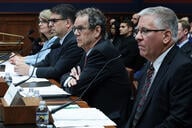You have /5 articles left.
Sign up for a free account or log in.
Public higher education in California may be nearing the breaking point. And the endgame for the worst off among the state’s budget-battered colleges might look like the accreditation crisis that is engulfing the City College of San Francisco.
The two-year college has failed to adequately cope with its money woes, according to a report released this week by the college’s regional accreditor, which gave City College less than nine months to correct a series of financial and administrative problems, some of which were identified as far back as 2006.
The action taken by the Accrediting Commission for Community and Junior Colleges of the Western Association of Schools and Colleges is more serious than placing the college on probation -- a step the commission skipped in City College's case. The “show cause” order is a big step closer to revoked accreditation, and the burden of proof is on the college to prove why that should not happen. If City College lost its accreditation, students would no longer be able to receive federal financial aid and the college would go under -- a prospect acknowledged by the commission, which called for the college to prepare a “closure report.”
The shuttering of California’s largest college would be a five-alarm fiasco. With a total enrollment of about 90,000 students (33,000 full-time) and 12 campuses and sites around San Francisco, City College is probably too big to fail. Most of those students would have no other local option, and the rest of the state’s community colleges could hardly absorb them, anyhow, given that the system will turn away an estimated 200,000 students this year because of financial shortfalls.
As a result, City College’s closure is unlikely, observers say. But the college has its work cut out for it. The commission didn’t blink in 2005 when it shut down Compton Community College because of fiscal mismanagement. In that case, however, the much smaller college was consumed by El Camino Community College, becoming a campus center, where enrollment is actually up.
The commission’s fix-it list is long and the timeline is short. The college is also dealing with further budget cuts, which will get worse if voters don’t pass a tax hike this fall. (A projected $14 million deficit will grow to $24 million without the new revenue, according to the college.) And City College does not have its leadership in place. Don Q. Griffin, the college’s chancellor, stepped down earlier this year after being diagnosed with brain cancer. He was replaced on an interim basis by Pamila Fisher.
"The evaluation report found little evidence of the ongoing assessment, integrated planning, financing/budgeting and improvement that is required of an accredited institution," Barbara A. Beno, president of the commission, wrote in a letter to City College. "The commission also noted that the funding base for City College appears to be inadequate to support the mission of the college as it is currently conceived."
The college takes the commission’s concerns “very seriously,” Fisher said in a written statement. “The report shows that clear, difficult choices must be made, immediately, and at a number of levels,”
Observers predict that if the college can demonstrate solid progress on the report’s 14 recommended fixes -- which cover governance, mission and financial controls -- the commission will give it the benefit of the doubt and keep the doors open. But playing chicken with an accreditor is generally a bad idea, so City College will have to move quickly and decisively.
“We’ll certainly do whatever it takes to keep the college open,” said Steve Ngo, a lawyer and member of City College’s Board of Trustees. Ngo said the college would make the changes required by its accreditor, “no matter how politically unpopular” some of those moves might be.
Who's in Charge?
The commission’s report includes several eye-popping findings. For starters, City College has been running deficits for three years and has dipped dangerously into reserves to cover shortfalls, according to the commission.
Another red flag is the college’s staffing levels, which are the opposite of top heavy. Faculty and staff compensation accounts for 92 percent of expenditures, a ratio the commission found does not leave enough money to run such a large college. And that problem is worsened by too few administrators being on the job. City College has only 39 administrators, according to the San Francisco Chronicle, which broke the news about the commission’s report. The college employs more than 1,800 faculty members.
The result is a cumbersome, sluggish planning process, according to the commission, which has been made worse by the budget crisis. For example, the report said City College did not finalize this year's budget plan until four months into the fiscal year.
“There exists a veil of distrust among the governance groups that manifests itself as an indirect resistance to board and administrative decision-making authority,” the commission found. “The team did not find evidence of clearly delineated roles and authority for decision making, thereby hindering timely communication, decisions and results.”
Shaky planning won’t cut it in this fiscal environment, according to the commission, which painted a grim picture of the "unstable" college’s future.
“Without sufficient cash flow and reserves to maintain financial stability and realistic plans for the future, City College will be challenged to maintain financial solvency,” the report said. “Unless the scope of the mission is adjusted or the college finds an additional stable funding source, it is unlikely the college can continue programs at its current level.”
The San Francisco Way
So how did the situation at City College get this bad? The answer, it seems, is one of culture.
People take open access seriously in San Francisco. No college in the state has a deeper attachment to its mission of serving as many students as possible. And City College also prides itself on a decentralized decision-making process, which allows plenty of experimentation at the department level. But those traditions aren’t particularly helpful while a college absorbs a flurry of budget cuts.
City College “has a long history of delegation,” which “was a good thing for long time,” said Scott Lay, president and CEO of the Community College League of California. But “that doesn’t actually work with several years of budget austerity.”
The report failed to fully acknowledge the role of state funding cuts in causing problems at the college, said Alisa Messer, an English instructor at City College and president of the local chapter of the American Federation of Teachers, the college’s primary faculty union. And she defended City College for sticking to its mission.
“We’re trying not to close the door to our students,” she said, adding that “these are truly contradictory and impossible times.”
Messer also defended the college’s stripped-down approach to administration, which she said has been a deliberate attempt to serve as many students as possible in tight times by “trying to maintain people in the front lines.”
All sides agree that something has to give for City College to get out of its accreditation hole. The state’s 112 community colleges are in the process of making several systematic changes, such as prioritizing first-time students who are most likely to succeed. City College has been in the lead on some related reforms, earning it plaudits from state leaders and powerful foundations. But the college may have to close some of its campuses. And a paring back of academic offerings is probably in City College’s future, observers say, which will be painful and politically divisive.
The college must do a better job of measuring "institutional effectiveness to improve student learning outcomes," the commission wrote. "City College needs to fully integrate the major components of a comprehensive planning process that is directly linked to an annual budget."
The next few months will be busy at the college, which has called in the state’s Fiscal Crisis and Management Assistance Team for help as it moves quickly to address the commission’s 14 recommendations. The college must submit an initial plan to the commission by mid-October, just three months from now.
That will be a "Herculean" challenge, Lay said, adding that the commission sent a clear signal that City College must make substantial changes in how it operates. “This is a big wake-up call.”
Even so, Lay does not think the closure of City College is a legitimate possibility.
“If a community college in San Francisco can’t make it, can one anywhere?” he said.
(Photo: Scott Beale/Laughing Squid)




